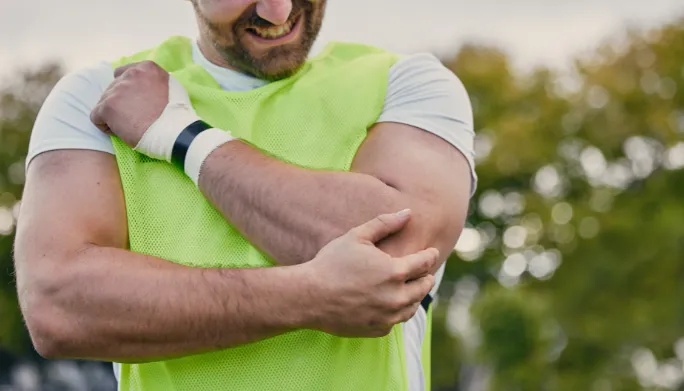Rotator Cuff Tear in St. George, UT

Regaining Mobility and Strength After a Rotator Cuff Tear
Recovering from Shoulder Pain and Weakness
A rotator cuff tear can significantly impact your ability to lift, rotate, and use your arm without discomfort. Whether the injury occurred suddenly or developed over time due to repetitive movements, proper rehabilitation is essential for restoring shoulder function and preventing long-term complications.
At Scratch Physical Therapy and Wellness, we provide targeted physical therapy to help individuals recover from rotator cuff tears, reduce pain, and regain full mobility. With personalized treatment plans, we focus on strengthening the shoulder, improving flexibility, and supporting long-term joint health.
Signs of a Rotator Cuff Tear
A rotator cuff tear occurs when one or more of the tendons stabilizing the shoulder joint are damaged. Symptoms can range from mild discomfort to significant movement restrictions. Common signs include:
- Pain when lifting or reaching overhead
- Weakness in the shoulder and upper arm
- Stiffness and reduced range of motion
- Difficulty sleeping due to shoulder discomfort
- A popping or clicking sensation when moving the shoulder
Early intervention is key to preventing further damage and ensuring proper recovery. If you’re experiencing these symptoms, a professional evaluation can determine the best course of treatment.
Physical Therapy for Rotator Cuff Rehabilitation
A structured rehabilitation program helps restore shoulder function by addressing pain, mobility, and strength deficits. At Scratch Physical Therapy and Wellness, our treatment approach includes:
1. Pain and Inflammation Management
- Hands-on manual therapy to improve circulation and relieve stiffness
- Application of heat or ice to reduce swelling and promote healing
- Education on activity modification to prevent further strain
2. Restoring Range of Motion
- Gentle stretching exercises to increase flexibility
- Joint mobilization techniques to improve shoulder movement
- Postural training to reduce unnecessary stress on the shoulder joint
3. Strengthening Shoulder and Supporting Muscles
- Targeted exercises for the rotator cuff muscles
- Scapular stabilization drills to enhance shoulder blade control
- Resistance training to gradually rebuild functional strength
4. Functional Movement Training
- Movement pattern correction to restore normal shoulder mechanics
- Sport- or work-specific exercises tailored to daily activities
- Gradual progression toward full arm use without pain
The Benefits of Rotator Cuff Rehabilitation
1. Improved Shoulder Function
- Increases mobility and flexibility for better arm movement
- Enhances stability and strength for daily tasks and recreational activities
2. Pain Relief and Injury Prevention
- Reduces discomfort through targeted therapy and movement correction
- Prevents reinjury by addressing muscle imbalances and joint mechanics
3. Non-Surgical Recovery Options
- Supports natural healing for many types of rotator cuff tears
- Reduces the need for surgical intervention in mild to moderate cases
4. Faster Return to Activity
- Helps individuals regain full use of the arm safely and efficiently
- Guides return to work, exercise, or sports with minimal risk of reinjury
Frequently Asked Questions
Can a rotator cuff tear heal without surgery?
Many small or partial tears heal with physical therapy. A customized treatment plan can reduce pain, improve strength, and restore function without the need for surgery.
How long does it take to recover from a rotator cuff tear?
Recovery time varies based on the severity of the tear and the consistency of treatment. Mild cases may improve within a few weeks, while more significant injuries require several months of rehabilitation.
Is it safe to exercise with a rotator cuff tear?
Exercise is an essential part of recovery but must be performed under professional guidance. Strengthening the shoulder with appropriate movements can aid healing, while improper exercises may worsen the injury.
What happens if a rotator cuff tear is left untreated?
Without proper care, a tear can worsen over time, leading to chronic pain, decreased function, and potential joint damage. Seeking early treatment improves outcomes and helps prevent complications.
Meet the Rehabilitation Team
Dr. Cliff Snyder, PT, DPT, specializes in shoulder rehabilitation and injury prevention. With experience in treating rotator cuff injuries, they develop individualized therapy plans to help patients recover effectively and regain strength.
Start Your Recovery Today
If shoulder pain is limiting your mobility and daily activities, specialized physical therapy can help you recover. Contact Scratch Physical Therapy and Wellness today to schedule an evaluation and begin a tailored treatment program designed to restore strength and function.
About the Author
Dr. Cliff Snyder, PT, DPT, focuses on musculoskeletal rehabilitation and injury prevention. At Scratch Physical Therapy and Wellness, they develop patient-centered therapy plans that promote healing and long-term joint health.


